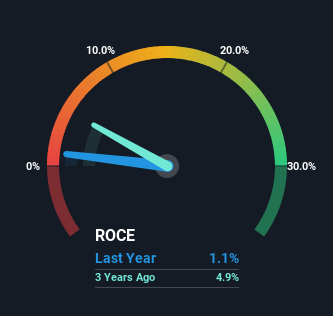China Aviation Oil (Singapore) (SGX:G92) Is Reinvesting At Lower Rates Of Return
Finding a business that has the potential to grow substantially is not easy, but it is possible if we look at a few key financial metrics. In a perfect world, we'd like to see a company investing more capital into its business and ideally the returns earned from that capital are also increasing. Put simply, these types of businesses are compounding machines, meaning they are continually reinvesting their earnings at ever-higher rates of return. In light of that, when we looked at China Aviation Oil (Singapore) (SGX:G92) and its ROCE trend, we weren't exactly thrilled.
Understanding Return On Capital Employed (ROCE)
Just to clarify if you're unsure, ROCE is a metric for evaluating how much pre-tax income (in percentage terms) a company earns on the capital invested in its business. The formula for this calculation on China Aviation Oil (Singapore) is:
Return on Capital Employed = Earnings Before Interest and Tax (EBIT) ÷ (Total Assets - Current Liabilities)
0.011 = US$10m ÷ (US$1.8b - US$849m) (Based on the trailing twelve months to June 2023).
So, China Aviation Oil (Singapore) has an ROCE of 1.1%. Ultimately, that's a low return and it under-performs the Oil and Gas industry average of 12%.
See our latest analysis for China Aviation Oil (Singapore)
Above you can see how the current ROCE for China Aviation Oil (Singapore) compares to its prior returns on capital, but there's only so much you can tell from the past. If you're interested, you can view the analysts predictions in our free report on analyst forecasts for the company.
So How Is China Aviation Oil (Singapore)'s ROCE Trending?
On the surface, the trend of ROCE at China Aviation Oil (Singapore) doesn't inspire confidence. To be more specific, ROCE has fallen from 2.7% over the last five years. And considering revenue has dropped while employing more capital, we'd be cautious. This could mean that the business is losing its competitive advantage or market share, because while more money is being put into ventures, it's actually producing a lower return - "less bang for their buck" per se.
On a related note, China Aviation Oil (Singapore) has decreased its current liabilities to 48% of total assets. So we could link some of this to the decrease in ROCE. What's more, this can reduce some aspects of risk to the business because now the company's suppliers or short-term creditors are funding less of its operations. Since the business is basically funding more of its operations with it's own money, you could argue this has made the business less efficient at generating ROCE. Either way, they're still at a pretty high level, so we'd like to see them fall further if possible.
The Bottom Line
We're a bit apprehensive about China Aviation Oil (Singapore) because despite more capital being deployed in the business, returns on that capital and sales have both fallen. Investors haven't taken kindly to these developments, since the stock has declined 34% from where it was five years ago. Unless there is a shift to a more positive trajectory in these metrics, we would look elsewhere.
China Aviation Oil (Singapore) could be trading at an attractive price in other respects, so you might find our free intrinsic value estimation on our platform quite valuable.
For those who like to invest in solid companies, check out this free list of companies with solid balance sheets and high returns on equity.
Have feedback on this article? Concerned about the content? Get in touch with us directly. Alternatively, email editorial-team (at) simplywallst.com.
This article by Simply Wall St is general in nature. We provide commentary based on historical data and analyst forecasts only using an unbiased methodology and our articles are not intended to be financial advice. It does not constitute a recommendation to buy or sell any stock, and does not take account of your objectives, or your financial situation. We aim to bring you long-term focused analysis driven by fundamental data. Note that our analysis may not factor in the latest price-sensitive company announcements or qualitative material. Simply Wall St has no position in any stocks mentioned.

